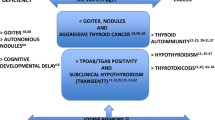Abstract
Iodine is an essential component of thyroid hormones; high intake may lead to thyroid disease. Epidemiologic researches have shown that exposure to iodine may be involved in the onset and development of autoimmune thyroiditis. Iodine may induce hypothyroidism in patients with autoimmune thyroiditis in a dose-dependent manner. The aim of the present study was to investigate the effects of dosages of iodine on thyroid autoimmunity, morphology, structure, and function in autoimmune-prone animals. NOD.H-2h4 mice were randomly divided into normal iodine, 5-fold, 10-fold, 100-fold, 1,000-fold iodine excess group, anesthetized by diethyl ether and bleed from eye socket vein at 4, 8, 16, and 24 weeks after the commencement of experiment. Iodine and thyroid hormone levels in the thyroid tissue and sera, serum thyroglobulin antibody levels, as well as thyroid gland histological appearance were measured. Excessive iodine caused thyroid goiter, and there was a positive correlation between the thyroid weight and the dosage of iodine (r = 0.64–0.92, P < 0.01). Iodine overdose ultrastructurally damaged thyroid epithelial cells in a dose-dependent manner. The incidence of thyroiditis, as well as the degree of lymphocytic infiltration in the thyroid gradually increased as the dosage increased (r = 0.87–0.98, P ≤ 0.05). Excessive iodine intake might induce goiter, lead to thyroiditis, worsen lymphocytic infiltration, as well as damage to the thyroid follicular structure in a dose-dependent manner in autoimmune-prone NOD.H-2h4 mice.



Similar content being viewed by others
References
WHO. Assessment of iodine deficiency disorders and monitoring their elimination (2001) A guide for programme managers. 2nd edn
Pretell EA, Delange F, Hostalek U et al (2004) Iodine nutrition improves in Latin America. Thyroid 14:590–599
Teng W, Shan Z, Teng X et al (2006) Effect of iodine intake on thyroid diseases in China. N Engl J Med 354:2783–2793
Słowińska-Klencka D, Klencki M, Sporny S et al (2002) Fine-needle aspiration biopsy of the thyroid in an area of endemic goiter: influence of restored sufficient iodine supplementation on the clinical significance of cytological results. Eur J Endocrinol 146:19–26
Reinhardt W, Luster M, Rudorff KH et al (1998) Effect of small doses of iodine on thyroid function in patients with Hashimoto’s residing in an area of mild iodine deficiency. Eur J Endocrinol 139:23–28
Ma T, Lu TZ, Yu ZH (1993) Iodine deficiency diseases in endemic goiter and endemic cretinism, 2nd edn. People’s Medical Publishing House, Beijing, pp 53–55
Ma T, Yu ZH, Lu TZ et al (1982) High-iodide endemic goiter. Chin Med J 95:692–696
Allen EM, Appel MC, Braveman LE (1986) The effect of iodine ingestion on the development of spontaneous lymphocytic thyroiditis in the diabetes-prone BB/W rat. Endocrinology 118:1977–1981
Bagchi N, Brown TR, Sundick RS (1995) Thyroid cell injury is an initial event in the induction of autoimmune thyroiditis by iodine in obese strain chickens. Endocrinology 136:5054–5060
Rasooly L, Burek CL, Rose NR (1996) Iodine-induced autoimmune thyroiditis in NOD.H-2h4 mice. Clin Immunol Immunopathol 81:287–292
McLachlan SM, Braley-Mullen H, Chen CR et al (2005) Dissociation between iodide-induced thyroiditis and antibody-mediated hyperthyroidism in NOD.H-2h4 mice. Endocrinology 146:294–300
Braley-Mullen H, Yu S (2000) Early requirement for B cells for development of spontaneous autoimmune thyroiditis in NOD.H-2h4 mice. J Immunol 165:7262–7269
Yu S, Sharp GC, Braley-Mullen H et al (2002) Dual roles for IFN-gamma, but not for IL-4, in spontaneous autoimmune thyroiditis in NOD.H-2h4 mice. J Immunol 169:3999–4007
Dunn JT, Crutchfield HE, Gutekunst R (1993) Methods for measuring iodine in urine. International Council for the Control of Deficiency Disorders, Wageningen
Teng XC, Jia XK, Fan CL (2007) Extraction, purification and identification thyroglobulin of mouse. Chin J Mod Med 17:1467–1469
Bagchi N, Brown TR, Urdanivia E et al (1985) Induction of autoimmune thyroiditis in chickens by dietary iodine. Science 230:325–327
Barin JG, Talor MV, Sharma RB et al (2005) Iodination of murine thyroglobulin enhances autoimmune reactivity in the NOD.H2h4 mouse. Clin Exp Immunol 142:251–259
Haiyan SL, Carayanniotis George (2007) Induction of goitrous hypothyroidism by dietary iodide in SJL mice. Endocrinology 148(6):2747–2752
Many MC, Mestdagh C, Van den Hove MF, Denef JF (1992) In vitro study of acute toxic effects of high iodide doses in human thyroid follicles. Endocrinology 131:621–630
Vitale M, Di Matola T, D’Ascoli F et al (2000) Iodide excess induces apoptosis in thyroid cells through a p53-independent mechanism involving oxidative stress. Endocrinology 141:598–605
Ruwhof C, Drexhage HA (2001) Iodine and thyroid autoimmune disease in animal models. Thyroid 11:427–436
Acknowledgments
The study was supported by grants from the China Medical Board (CMB) in New York, the National Natural Science Fund of China (NNSFC), and Key Laboratory Project of Liaoning Province (2008 S 225).
Conflict of interest statement
The authors declare that they have no conflict of interest related to the publication of this manuscript.
Author information
Authors and Affiliations
Corresponding author
Rights and permissions
About this article
Cite this article
Teng, X., Shan, Z., Teng, W. et al. Experimental study on the effects of chronic iodine excess on thyroid function, structure, and autoimmunity in autoimmune-prone NOD.H-2h4 mice. Clin Exp Med 9, 51–59 (2009). https://doi.org/10.1007/s10238-008-0014-0
Received:
Accepted:
Published:
Issue Date:
DOI: https://doi.org/10.1007/s10238-008-0014-0




